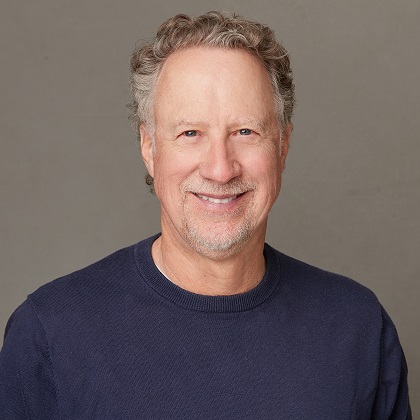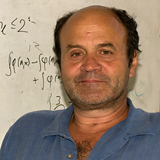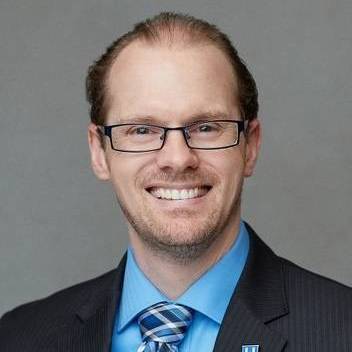Math Sciences
Ergodic Theory
Ergodic theory at the University of Memphis
The first ergodic theorist arrived in our department in 1984. Today, we have an internationally known group of faculty involved in a diverse cross-section of research in ergodic theory (listed below), with collaborators from around the world. Members of our group have been the recipients of NSF research grants, have organized conferences and special programs both locally, nationally, and internationally, and have mentored several graduate students at both the Masters and Ph.D. levels.
History
Ergodic Theory may be generally defined as the study of the average behavior of systems that change with time. Its origins lie in statistical mechanics, which was developed by Boltzmann towards the end of the nineteenth century.
Statistical mechanics aims to describe the collective behavior of a large number of moving particles. Mechanics is not usable for such a system since it would require to solve trillions and trillions of differential equations. Boltzmann revolutionary idea was to use statistical methods.
Since Boltzmann's work, statistical mechanics has become one of the pillars of physics. In fact, quantum theory, one of the two revolutions of twentieth century physics, was invented to solve a problem in statistical mechanics.
Ergodic theory was developed to try to justify the basic assumption of Boltzmann, the so called ergodic hypothesis. While it's a relatively young subject, ergodic theory is quite developed. A crucial feature of ergodic theory is its viewpoint it lends to seemingly unrelated mathematical problems. Ergodic theory has found applications in many parts of mathematics: number theory, harmonic analysis, dynamical systems, probability, mathematical physics. Correspondingly, many recent important developments in mathematics were solved using tools from ergodic theory. The importance of ergodic theory in today's mathematics is signified by the fact that some of the greatest prizes in mathematics (Fields medal, Wolf prize, Abel prize) were given out for work related to ergodic theory.
Weekly Seminars
The groups holds weekly research seminars with presentations from faculty and graduate students. The aim is to introduce graduate students to active research areas and guide them to a dissertation topic. Seminars can be found on the News & Events page.
Recommended Courses
In order to carry out research in Ergodic theory, foundational courses need to be mastered as well as core areas.
Foundational Courses
- Math 7350 - Real Variables I
- Math 7351 - Real Variables II
- Math 7261 - Algebraic Theory I
- Math 7361 - Complex Analysis (if interested in complex dynamics)
- Math 7411 - Point Set Topology (Recommended but not truly necessary)
Subject-related Courses
Additional Useful Courses
- Math 7016 - Fourier Analysis
- Math 7/8355 - Functional Analysis I
- Math 7/8356 - Functional analysis
- Math 7613 - Probability Theory
For more information on course descriptions, see the graduate catalog.
Members
Below are research interests and two representative or recent publications from each member. Also included for each member is a list of research interests and personal statement.
 James T. Campbell, Professor; Undergraduate Coordinator
James T. Campbell, Professor; Undergraduate Coordinator
Research Interests: Ergodic theory, complex dynamics
Personal Statement: The original attraction of ergodic theory for me was the interplay between harmonic
analysis and ergodic theory, in particular questions relating the spectral theory
of operators to ergodic theorems; almost everywhere convergence; and oscillation inequalities.
Recently, working with recently-graduated Ph. D. student Jared Collins I became interested
and continue to work in complex dynamics; and in collaboration with Randall McCutcheon,
recurrence and ergodic Ramsey Theory.
- Campbell, James T. and Collins, Jared T. (2013) Specifying attracting cycles for Newton maps of polynomials. Journal of Difference Equations and Applications, 19(8). 1361-1379.
- Campbell, James T., Jones, Roger L., Reinhold, Karin, and Wierdl, Máté. (2000). Oscillation and variation for the Hilbert transform. Duke Math. J., 105(1). 59-83.
 Randall McCutcheon, Professor
Randall McCutcheon, Professor
Research Interests: Ergodic ramsey theory
Personal Statement:I held visiting positions at Case Western, Wesleyan and Maryland (College Park) before
coming to Memphis in 2001. My mathematical research falls broadly into the areas of
ergodic theory, especially recurrence (with applications to density Ramsey theory),
and topological dynamics, especially the algebra of the Stone-Cech compactification
of a semigroup (with applications to chromatic Ramsey theory). More recently, I have
ventured into the philosophy of probability.
- D sets and IP rich sets in Z. Fund. Math. 233 (2016), 71-82. (With Jee Zhou).
- In favor of logarithmic scoring. Philos. Sci. 86 (2019), 286–303.
- Regression to the Mean and Judy Benjamin. Forthcoming in Synthese.
 Máté Wierdl, Professor
Máté Wierdl, Professor
Research Interests: Ergodic theory, almost everywhere convergence
Personal Statement: I am interested in basic convergence problems, subsequence ergodic theorems, recurrence,
combinatorial and analytic number theoretical connections, fourier analytic connections,
applications. I have been also working in physics on the foundations of thermodynamics.
I held visiting positions at Ohio State University, Indiana University, Bloomington,
University of Maryland, Northwestern University, University of North Carolina at Chapel
Hill, Mathematical Sciences Research Institute, Berkeley, Tours, France.
- Chan, T. H., Kumchev, A. V., and Wierdl, M. (2010). Additive bases arising from functions in a Hardy field. Acta Math. Hungar., 129(3) 263-276.
- Jones, Roger L., Kaufman, Robert, Rosenblatt, Joseph M., and Wierdl, Máté. (1998). Oscillation in ergodic theory. Ergodic Theory Dynam. Systems, 18(4). 889-935.
 Alistair Windsor, Associate Professor; Director, Institute for Intelligent Systems
Alistair Windsor, Associate Professor; Director, Institute for Intelligent Systems
Research Interests: Dynamical systems and ergodic theory
Personal Statement: Prior to coming to the University of Memphis I held positions at the University of
Manchester, Manchester, England, and the University of Texas at Austin, Austin, Texas.
My early work was in constructing smooth systems, such as might appear in a physical
system, with specified ergodic properties. worked more generally in the area of smooth
dynamical systems including some work on integral equations, dynamical cohomology,
and some applications to tiling theory. Since coming to Memphis I have made some forays
into combinatorial ergodic theory.
- de la Llave, Rafael and Windsor, Alistair. (2011). Smooth dependence on parameters of solutions to cohomology equations over Anosov systems with applications to cohomology equations on diffeomorphism groups. Discrete Contin. Dyn. Syst., 29(3). 1141-1154.
- Fayad, B. R., Saprykina, M., and Windsor, A. (2007). Non-standard smooth realizations of Liouville rotations. Ergodic Theory Dynam. Systems 27 (6). 1803-1818.
